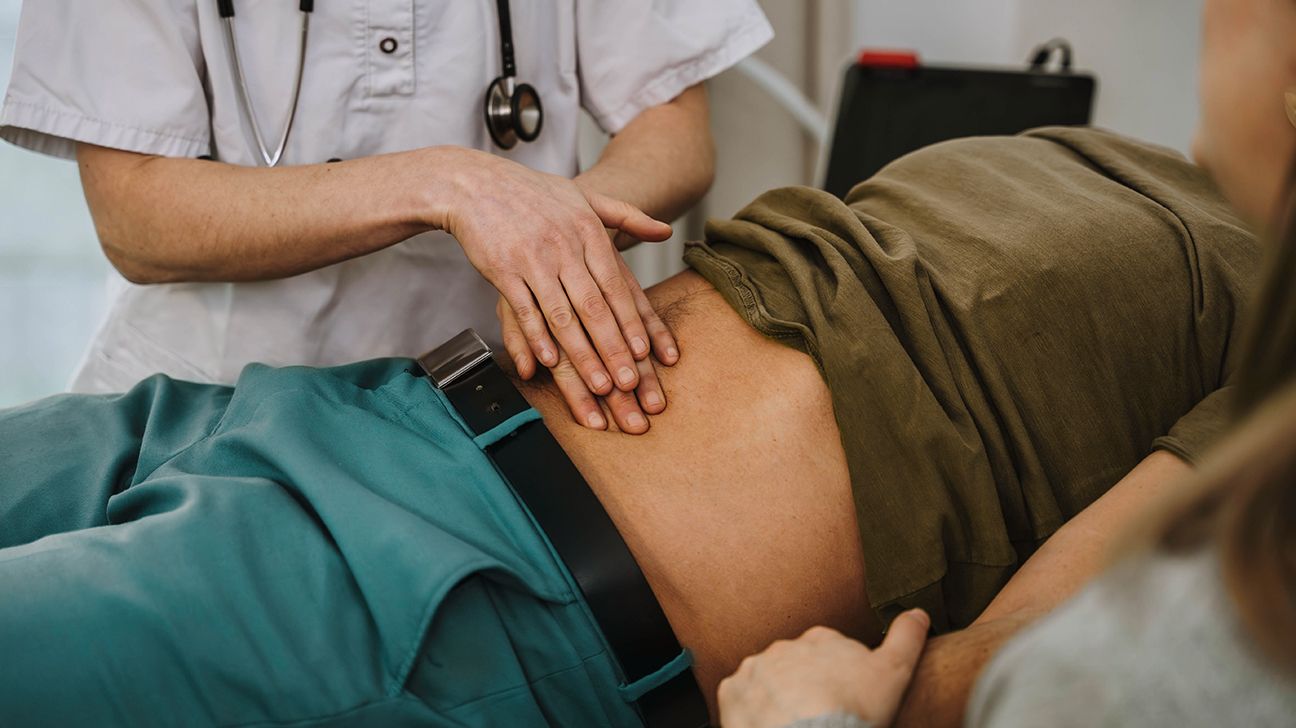Gastrointestinal perforation (GP) occurs when a hole forms all the way through the stomach, large bowel, or small intestine. It can be caused by several different conditions, such as appendicitis and diverticulitis. In most cases, surgery is needed to close the hole.

Gastrointestinal perforation (GP), or intestinal perforation, is where a hole develops in your gastrointestinal (GI) tract. While it can be caused by several health conditions, it can also result from trauma, such as a knife or gunshot wound.
A hole in your gastrointestinal system can lead to peritonitis, an inflammation of the membrane that lines the abdominal cavity.
Peritonitis can occur when any of the following enters the abdominal cavity:
- bacteria
- bile
- stomach acid
- partially digested food
- stool
GP is a medical emergency that requires immediate medical treatment. The condition is life threatening and chances of recovery improve with early diagnosis and treatment.
Symptoms of GP may include:
If you’ve had a gastrointestinal perforation and peritonitis occurs, the abdomen may feel painful and tender. This can often worsen if someone touches the area or when you move. The abdomen may also stick outward more than what is usual for you and feel hard.
There are many possible causes of GP, including health conditions such as:
- stomach ulcers
- diverticulitis
- appendicitis
- cholecystitis
- inflammatory bowel diseases such as Crohn’s disease or ulcerative colitis
- cancer in the gastrointestinal tract
- inflamed Meckel’s diverticulum, congenital abnormality of the small intestine
GP can also be caused by external factors such as:
- blunt trauma to the abdomen
- a knife or gunshot wound to the abdomen
- abdominal surgery
- ingestion of foreign objects or caustic substances, which are chemicals that can cause severe burns when ingested
Rarely, the condition may occur due to bowel injuries from an endoscopy or colonoscopy.
To
Alongside these tests, they will order lab work to:
- look for signs of infection, such as a high white blood cell count
- evaluate your hemoglobin level, which can indicate if you have blood loss
- evaluate electrolytes
- evaluate acid level in the blood
- assess kidney function
- assess liver function
In most cases, surgery is necessary to
- fix the anatomical problem
- fix the cause of peritonitis
- remove any foreign material in the abdominal cavity that might cause problems, such as feces, bile, and food
In rare cases, a doctor may forgo surgery and only prescribe antibiotics if the hole has closed on its own.
GP
Complications associated with GP include:
- bleeding
- sepsis, which is a life threatening bacterial infection
- abscesses in the abdomen
- a wound infection
- a bowel infarction, which is the death of part of the bowel
- a permanent ileostomy or colostomy
In some cases, GP can be fatal.
Wound failure may also occur. This is where the wound can’t or doesn’t heal. Factors that
- malnutrition, or poor diet
- smoking
- infection
- presence of necrotic tissue, the death of cells in the tissue
- type 2 diabetes
- ischemia, reduced bloow flow
- poor hygiene
- glucocorticoid use,
- radiation exposure
Certain anti-inflammatory drugs that suppress the immune system, such as steroids or corticosteroids, can also result in complications, by masking an ongoing infection and delaying diagnosis.
The success of surgery to repair a perforation
- advanced age
- existing bowel disease
- bleeding complications
- malnutrition
- the nature of the original cause
- smoking
- active treatment for cancer
- conditions requiring steroids or biologic agents, such as lupus or rheumatoid arthritis
- other medical conditions such as heart disease, kidney or liver problems, and emphysema
If you experience pain or fever and believe you’re at risk of having a GP, you should seek medical attention immediately. The sooner you begin treatment, the better your outlook will be.
Preventing gastrointestinal perforation
There are many causes of GP. For example, an underlying gastrointestinal disease
Can gastrointestinal perforation heal on its own?
In rare cases, gastrointestinal perforation can heal on its own and not require surgery. In this instance, a doctor will typically prescribe antibiotics to clear up any infections.
Could you have a perforated stomach and not know?
In rare cases, it is possible to have a perforated stomach and not know. As the
What is the survival rate of a gastrointestinal perforation?
The survival rate of gastrointestinal perforation is around 50 to 70%. The risk of mortality can increase the longer treatment is delayed. Chances of recovery can improve with an early diagnosis and treatment.
Gastrointestinal perforation (GP), or intestinal perforation, occurs when a hole forms all the way through the stomach, large bowel, or small intestine. It can be caused by a health condition, such as inflammatory bowel disease (IBD), or from the result of trauma to the body, such as a knife or gunshot wound.
To diagnose GP, a doctor will take X-rays of your chest or abdomen. If a positive diagnosis occurs, surgery will most likely be needed to repair the hole and treat the condition.
If you experience any significant change from your usual state, especially if you have abdominal pain and fever, consider speaking with a doctor. Chances of recovery from GP improve with early diagnosis and treatment.




